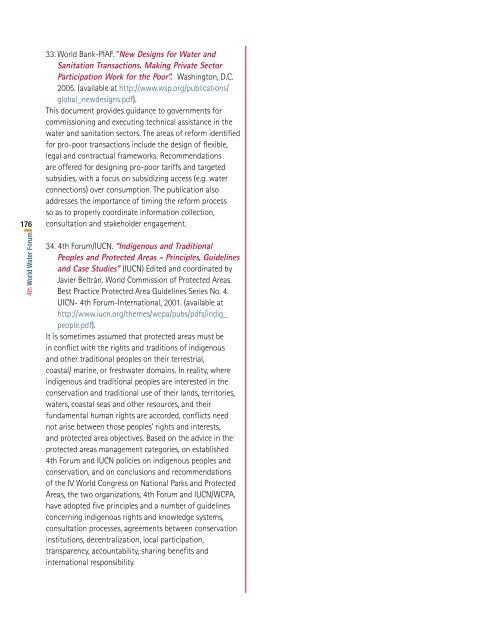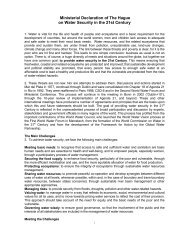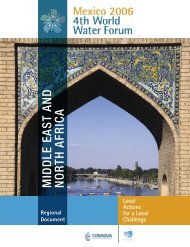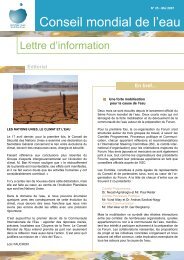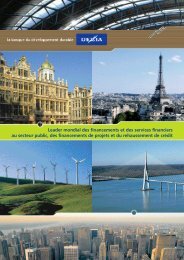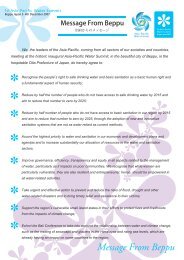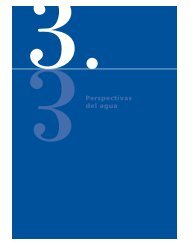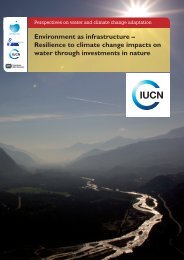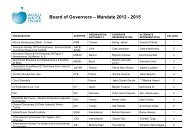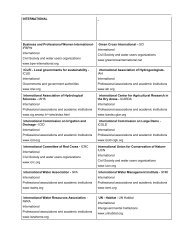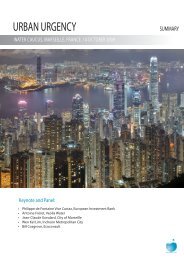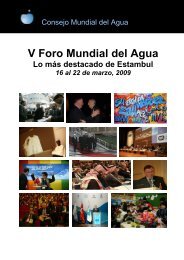Americas ok.indd - World Water Council
Americas ok.indd - World Water Council
Americas ok.indd - World Water Council
Create successful ePaper yourself
Turn your PDF publications into a flip-book with our unique Google optimized e-Paper software.
17633. <strong>World</strong> Bank-PIAF. “New Designs for <strong>Water</strong> andSanitation Transactions. Making Private SectorParticipation Work for the Poor”. Washington, D.C.2005. (available at http://www.wsp.org/publications/global_newdesigns.pdf).This document provides guidance to governments forcommissioning and executing technical assistance in thewater and sanitation sectors. The areas of reform identifiedfor pro-poor transactions include the design of flexible,legal and contractual frameworks. Recommendationsare offered for designing pro-poor tariffs and targetedsubsidies, with a focus on subsidizing access (e.g. waterconnections) over consumption. The publication alsoaddresses the importance of timing the reform processso as to properly coordinate information collection,consultation and stakeholder engagement.4th <strong>World</strong> <strong>Water</strong> Forum34. 4th Forum/IUCN. “Indigenous and TraditionalPeoples and Protected Areas - Principles, Guidelinesand Case Studies” (IUCN) Edited and coordinated byJavier Beltrán. <strong>World</strong> Commission of Protected Areas.Best Practice Protected Area Guidelines Series No. 4.UICN- 4th Forum-International, 2001. (available athttp://www.iucn.org/themes/wcpa/pubs/pdfs/indig_people.pdf).It is sometimes assumed that protected areas must bein conflict with the rights and traditions of indigenousand other traditional peoples on their terrestrial,coastal/ marine, or freshwater domains. In reality, whereindigenous and traditional peoples are interested in theconservation and traditional use of their lands, territories,waters, coastal seas and other resources, and theirfundamental human rights are accorded, conflicts neednot arise between those peoples’ rights and interests,and protected area objectives. Based on the advice in theprotected areas management categories, on established4th Forum and IUCN policies on indigenous peoples andconservation, and on conclusions and recommendationsof the IV <strong>World</strong> Congress on National Parks and ProtectedAreas, the two organizations, 4th Forum and IUCN/WCPA,have adopted five principles and a number of guidelinesconcerning indigenous rights and knowledge systems,consultation processes, agreements between conservationinstitutions, decentralization, local participation,transparency, accountability, sharing benefits andinternational responsibility.


